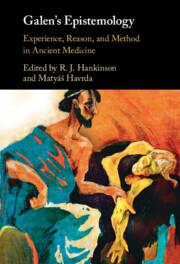Book contents
- Galen’s Epistemology
- Galen’s Epistemology
- Copyright page
- Contents
- Abbreviations
- Introduction
- Chapter 1 ‘Do I Wake or Sleep?’
- Chapter 2 Galen’s Empiricist Background
- Chapter 3 Discovery, Method, and Justification
- Chapter 4 From Problems to Demonstrations
- Chapter 5 Galen’s Notion of Dialectic
- Chapter 6 The Relationship between Perceptual Experience and Logos
- Chapter 7 Galen against Archigenes on the Pulse and What It Teaches Us about Galen’s Method of Diairesis
- Chapter 8 On Sense-Perception
- Chapter 9 Reason and Experience in Galen’s Moral Epistemology
- Chapter 10 The Arabic Alexandrians’ Summary of Galen’s On the Therapeutic Method
- Chapter 11 What Level of Certainty Can Medical Sign-Inference Reach?
- Bibliography
- Index of Passages
- General Subject Index
Chapter 4 - From Problems to Demonstrations
Two Case Studies of Galen’s Method
Published online by Cambridge University Press: 04 May 2022
- Galen’s Epistemology
- Galen’s Epistemology
- Copyright page
- Contents
- Abbreviations
- Introduction
- Chapter 1 ‘Do I Wake or Sleep?’
- Chapter 2 Galen’s Empiricist Background
- Chapter 3 Discovery, Method, and Justification
- Chapter 4 From Problems to Demonstrations
- Chapter 5 Galen’s Notion of Dialectic
- Chapter 6 The Relationship between Perceptual Experience and Logos
- Chapter 7 Galen against Archigenes on the Pulse and What It Teaches Us about Galen’s Method of Diairesis
- Chapter 8 On Sense-Perception
- Chapter 9 Reason and Experience in Galen’s Moral Epistemology
- Chapter 10 The Arabic Alexandrians’ Summary of Galen’s On the Therapeutic Method
- Chapter 11 What Level of Certainty Can Medical Sign-Inference Reach?
- Bibliography
- Index of Passages
- General Subject Index
Summary
The chapter discusses two texts designed to throw into sharp relief Galen’s methods of solving natural and dialectical problems. The first comes from the treatise The Mixtures and Powers of Simple Drugs (SMT), and deals with the power and nature of olive oil. Galen castigates one Archidamus for having arrived at a mistaken account of oil’s nature, because he has generalised from a limited set of observations of questionable relevance. In contrast, Galen proposes an orderly course of inquiry, which starts from the complete account of the oil’s observable attributes and proceeds towards causal investigation by means of their empirically testable ‘differentiations’. The second text is Thrasybulus, subtitled Whether Hygiene Belongs to Medicine or Gymnastics (Thras.), and the chater shows how Galen sets about answering that question in a quasi-dialectical manner. The first step is the discovery of an agreed starting-point, consisting of a relevant and non-question-begging description of the point at issue. This is followed by further conceptual clarification of the agreed description, which, as the chapter argues, plays a similar role in the dialectical dispute as ‘differentiation’ of observed attributes in the former case.
- Type
- Chapter
- Information
- Galen's EpistemologyExperience, Reason, and Method in Ancient Medicine, pp. 116 - 135Publisher: Cambridge University PressPrint publication year: 2022
- 2
- Cited by

